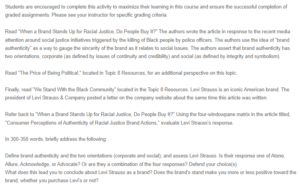When Brands Stand Up For Racial Justice
According to Södergren (2021), brand authenticity is defined as the extent to which consumers perceive a brand as being true and faithful to itself (continuity) and delivering its promises to consumers (credibility), motivated by its responsibility to care for the community (integrity) and implementing the values consumers consider to be significant (symbolism). On the one hand, continuity and credibility focus on the company and its customers; hence those aspects of the brand have a corporate orientation. Conversely, symbolism and integrity are focused on social issues outside the company’s control; hence these issues have a social orientation.
Levi Strauss’s response to the injustices directed toward the black community in America combines three of the four types of corporation and society-oriented actions. The company’s actions are atoning because it seeks to make amends for failing to listen to its black employees’ experiences at the community level and in the country (Menon & Kiesler, 2020). To that end, Levi Strauss is offering a $100,000 grant to Live Free, an organization dedicated to curbing gun violence and promoting economic and social justice among the black community. On the other hand, Levi Struss’s response also accounts for acknowledging that the company supports social and economic justice for the black community, even if it is not bound to profiteer directly (Menon & Kiesler, 2020). Also, under societal orientation, Levi Strauss plays an advocacy role by offering a $100,000 grant to the American Civil Liberties Union that actively advances racial justice and criminal justice reform.
I can conclude that Levi Strauss is an authentic brand based on its actions to restore justice for the Black American community. Levi Strauss built a solid reputation by engaging in impactful, socially responsible acts by standing for racial justice (Campagna et al., 2022). Although these actions come with some risks, they will most likely be rewarded with customer loyalty. I prefer a brand that stands for more than product/service quality and consumer benefits. Levi Strauss’s involvement in social justice issues is enough reason to buy from them.
References
Campagna, C. L., Donthu, N., & Yoo, B. (2022). Brand authenticity: literature review, comprehensive definition, and an amalgamated scale. Journal of Marketing Theory and Practice, 1–17. https://doi.org/10.1080/10696679.2021.2018937
Menon, G., & Kiesler, T. (2020, July 31). When a Brand Stands up for Racial Justice, Do People Buy It? Harvard Business Review. https://hbr.org/2020/07/when-a-brand-stands-up-for-racial-justice-do-people-buy-it
Södergren, J. (2021). Brand authenticity: 25 Years of research. International Journal of Consumer Studies, 45(4), 645–663. https://doi.org/10.1111/ijcs.12651
ORDER A PLAGIARISM-FREE PAPER HERE
We’ll write everything from scratch
Question
Students are encouraged to complete this activity to maximize their learning in this course and ensure the successful completion of graded assignments. Please see your instructor for specific grading criteria.

When Brands Stand Up For Racial Justice
Read “When a Brand Stands Up for Racial Justice, Do People Buy It?” The authors wrote the article in response to the recent media attention around social justice initiatives triggered by the killing of Black people by police officers. The authors use the idea of “brand authenticity” as a way to gauge the sincerity of the brand as it relates to social issues. The authors assert that brand authenticity has two orientations, corporate (as defined by issues of continuity and credibility) and social (as defined by integrity and symbolism).
Read “The Price of Being Political,” located in Topic 8 Resources, for an additional perspective on this topic.
Finally, read “We Stand With the Black Community” located in the Topic 8 Resources. Levi Strauss is an iconic American brand. The president of Levi Strauss & Company posted a letter on the company website about the same time this article was written.
Refer back to “When a Brand Stands Up for Racial Justice, Do People Buy It?” Using the four-windowpane matrix in the article titled, “Consumer Perceptions of Authenticity of Racial Justice Brand Actions,” evaluate Levi Strauss’s response.
In 300-350 words, briefly address the following:
Define brand authenticity and the two orientations (corporate and social), and assess Levi Strauss. Is their response one of Atone, Allure, Acknowledge, or Advocate? Or are they a combination of the four responses? Defend your choice(s).
What does this lead you to conclude about Levi Strauss as a brand? Does the brand’s stand make you more or less positive toward the brand, whether you purchase Levi’s or not?

